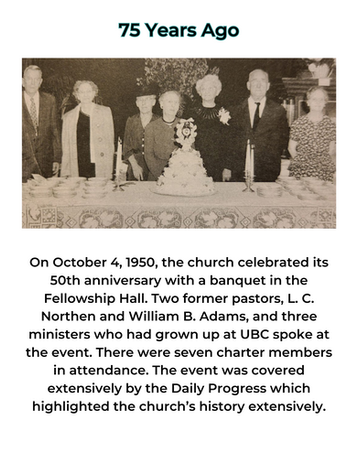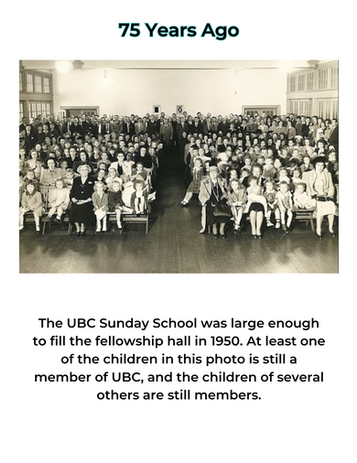
OUR HISTORY
HISTORY HIGHLIGHTS
University Baptist Church (UBC) has a storied history dating back to 1900, when it emerged from a split within Charlottesville Baptist Church.
Dr. Henry Tribble's resignation from Charlottesville Baptist Church catalyzed the formation of UBC, with 83 members gathering at the Levy Opera House to establish a new congregation. Initially known as High Street Baptist Church, UBC experienced significant growth under Dr. Tribble's leadership, expanding from 80 to 400 members during his tenure.




Financial struggles characterized much of UBC's early years, with the congregation often borrowing money to cover expenses and facing challenges in paying their pastor on time.
Despite these difficulties, the church's commitment to mission work remained steadfast, evidenced by its support for various causes and its reputation for financial generosity. However, the decision to relocate became inevitable as the congregation outgrew its original building on High Street. In 1929, facing financial troubles, the church moved to its current location and adopted the name University Baptist Church.
The leadership of Dr. Cecil Cook marked a period of renewal and growth for UBC. Despite a challenging start with only 39 attendees at the first meeting, Dr. Cook's leadership revitalized the congregation, leading to significant financial achievements such as repurchasing the church building and paying off the remaining mortgage ahead of schedule. UBC flourished under Dr. Cook's guidance, expanding its membership to 428 individuals and solidifying its reputation as a vibrant community of faith.
Throughout its history, UBC has demonstrated a commitment to inclusivity and social justice.
In 1969, amid racial tensions, the church passed a resolution affirming that membership would be based solely on an individual's Christian commitment, irrespective of race or background. This decision, although causing some members to leave, reflected UBC's dedication to embodying the principles of equality and acceptance. Subsequent decades saw further strides towards inclusivity, with the ordination of women as deacons and the church's decision to openly welcome individuals regardless of age, race, gender, or sexual orientation.
Under the leadership of Reverend Richard (Dick) Myers, UBC began its 22-year journey in 1963, during which it continued to evolve and embrace an ethos of inclusivity. Myers' tenure saw the formation of Jubilate, an auditioned college choir, and other initiatives aimed at fostering community engagement and spiritual growth.
Under the leadership of Dr. Tom Leland and Dr. Michael Cheuk, UBC expanded its community outreach efforts, engaging in various ministries and collaborations aimed at addressing social needs both locally and globally. Dr. Matthew Tennant, the current senior minister, has continued this legacy of service and innovation, leveraging technology to adapt to changing circumstances such as the COVID-19 pandemic and spearheading initiatives like the Myers Lecture Series and hunger relief efforts. As UBC looks to the future, it remains committed to its core values of worship, inclusivity, and social responsibility, guided by a rich history of faith and service.

























